Luc Louves (born February 22, 1989, in Pau) is a French basketball player who played 19 games for French Pro A league club Orleans from 2007 to 2009. [1]
Luc Louves (born February 22, 1989, in Pau) is a French basketball player who played 19 games for French Pro A league club Orleans from 2007 to 2009. [1]
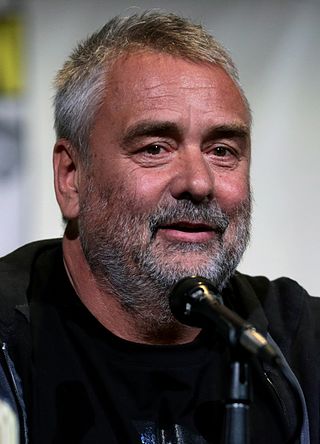
Luc Paul Maurice Besson is a French filmmaker. He directed or produced the films Subway (1985), The Big Blue (1988), and La Femme Nikita (1990). Associated with the Cinéma du look film movement, he has been nominated for a César Award for Best Director and Best Picture for his films Léon: The Professional (1994) and The Messenger: The Story of Joan of Arc (1999). He won Best Director and Best French Director for his sci-fi action film The Fifth Element (1997). He wrote and directed the sci-fi action film Lucy (2014) and the space opera film Valerian and the City of a Thousand Planets (2017).

Jean-Luc Godard was a French and Swiss film director, screenwriter, and film critic. He rose to prominence as a pioneer of the French New Wave film movement of the 1960s, alongside such filmmakers as François Truffaut, Agnès Varda, Éric Rohmer and Jacques Demy. He was arguably the most influential French filmmaker of the post-war era. According to AllMovie, his work "revolutionized the motion picture form" through its experimentation with narrative, continuity, sound, and camerawork.

Luc-sur-Mer is a commune in the Calvados department in the Normandy region in northwestern France.
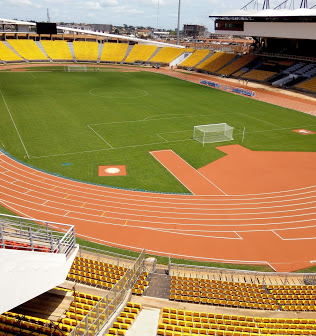
Ahmadou Ahidjo Stadium is a multi-purpose stadium in Yaoundé, Cameroon. It is used mostly for football matches and it also has athletics facilities. It was built in 1972. The stadium has been renovated in 2016 ahead of the African Women Cup of Nations tournament. It has a capacity of 42,500 seats. It is the home stadium of Canon Yaoundé, Tonnerre Yaoundé and the women's club Louves Minproff. The stadium is also known as the home venue of the Cameroonian national football team, who drew the stadium's record attendance of 120,000 in a football match in the 1980s. It was one of the venues used in the 2021 Africa Cup of Nations.

Ariane Moffatt is a Canadian singer-songwriter. Known for working across multiple musical genres, Moffatt's music combines elements of electronica, jazz, folk, and pop. A francophone, she is bilingual and has recorded tracks in both French and English. Her 2002 debut album Aquanaute went platinum in Quebec, earning 11 nominations at the 2003 ADISQ Awards and winning three Félix awards. She is known in Quebec for two well-received singles from Aquanaute: "La barricade" and "Dans un océan".

Le Conquet is a commune in the Finistère department of Brittany in northwestern France. This is the westernmost town of mainland France. Only three island towns—Ouessant, Île-Molène and Ile de Sein—are farther west.

Luc-la-Primaube is a commune in the Aveyron department in southern France, in Occitanie, 10 kilometres south of Rodez. Its inhabitants are called Lucois or Primaubois, after the two towns in the commune, Luc and La Primaube, which are 3 km (1.9 mi) apart.
La Louve is a private French contemporary garden, open to the public, in the town of Bonnieux in the Vaucluse department of France. It was created beginning in 1986 by Nicole de Vésian, textile designer for the Paris fashion house of Hermès. It is classified by the French Ministry of Culture as one of the Remarkable Gardens of France.
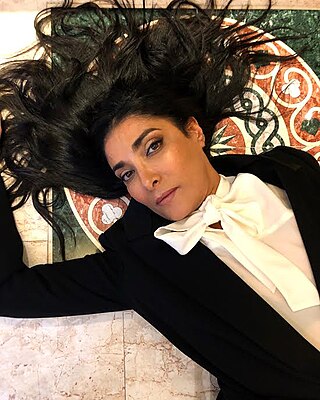
Fatima Adoum is a French actress.

Marie-Pierre Arthur is the stage name of Marie-Pierre Fournier, a Canadian pop singer-songwriter from Quebec. Originally from Grande-Vallée, she is currently based in Montreal.
Luc is a French masculine given name and occasional a diminutive form of other names. Notable persons and characters with this name include:
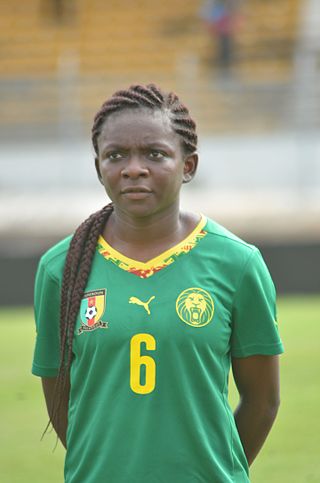
Genevieve Edith Ngo Mbeleck is a Cameroonian footballer who plays as a midfielder for Beijing Jingtan.
Anne Dandurand is a French-Canadian actor, producer, activist and author. She was born in Montreal, and appeared regularly on Canadian film and TV during the 1970s. She wrote her first book La louve-garou with her twin sister Claire Dé. She lives in Montreal.
Annette Jacky Messomo is a footballer who plays as a midfielder for Kosovan Women's Football League club KFF A&N. Born and raised in Cameroon, she is a naturalized citizen of Equatorial Guinea and has played for that women's national team.

L'Impératrice is a French pop and nu-disco band from Paris, formed in 2012. They are currently signed to French independent record label, microqlima.
Ange Gabrielle Bawou is a Cameroonian footballer who plays as a goalkeeper for Bayelsa Queens and the Cameroon women's national team.
Alice Flora Kameni Djientieu, known as Flora Kameni, is a Cameroonian footballer who plays as a forward for Louves Minproff and the Cameroon women's national team.
Augustine Chouchou Ngo Mback Batoum is a Cameroonian footballer who plays as a left midfielder for Louves Miniproff and the Cameroon women's national team.
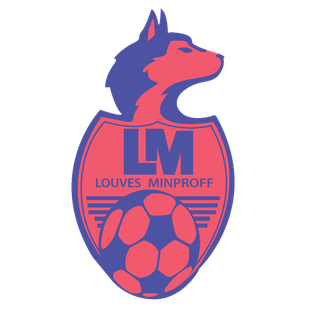
Louves Minproff de Yaoundé, usually referred to simply as Louves Minproff, is a Cameroonian women's football club based in Yaoundé.
Vanessa Noelle Kiomegne Djomo, also known as Vanessa Djomo or Kiomegne Djomo Vanessa, is a Cameroonian football midfielder, who plays for Kdz. Ereğli Belediye Spor in the Turkish Women's Super League with jersey number 8.